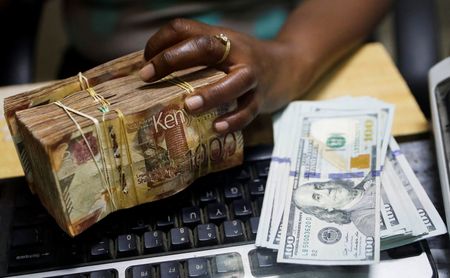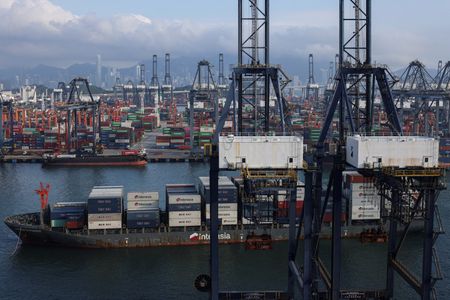By Libby George and Karin Strohecker
LONDON (Reuters) -Ghana and Zambia battled their way to debt restructuring deals with their primary creditors last year, but simmering disagreements over two key African banks could keep them in default for longer than anticipated, hampering their economic recoveries.
Four sources close to the talks said the Paris Club group of official lenders have made clear that the two nations must restructure their debts to two “baby multilateral” banks – the Eastern and Southern African Trade and Development Bank (TDB) and Afreximbank.
The disagreement over whether the banks must take losses, however, which is on the agenda at this week’s IMF/World Bank spring meetings in Washington, D.C., pits Western lenders against up-and-coming African institutions.
It is also another controversial snag in efforts to speed up debt restructuring for poor nations.
“The current international infrastructure for debt relief has left what we call ‘plurilateral institutions’ in a complete grey zone,” Thomas Moatti, director of Lazard’s sovereign advisory group, said in a recent Finance for Development Lab panel, specifically citing Afrexim and TDB.
PREFERRED CREDITORS OR NOT?
While Zambia’s and Ghana’s restructurings for bilateral and bond debt concluded last year, commercial debts worth billions must be restructured in both countries before ratings agencies S&P and Fitch move them out of sovereign default.
Government officials did not respond to requests for comment about whether they would restructure their Afrexim and TDB loans.
Officials from Ghana have previously said they do not want to impose losses on Afreximbank. Restructuring could impact the banks’ own borrowing costs and thus the amount they can lend and at what rates.
Zambia owes TDB roughly $555 million, and $45 million to Afreximbank, according to think tank ODI, while Ghana owes Afrexim at least $750 million, almost a quarter of its nearly $4 billion in commercial debt.
For their part, the banks say they are “multilateral” lenders like the IMF and World Bank, with preferred creditor status that precludes them from restructuring.
That status is typically given to banks that lend at comparatively low cost or support countries in debt troubles.
But neither the IMF nor the G20’s Common Framework tool for helping poor countries restructure has outlined a clear definition of who exactly gets preferred creditor status.
Afreximbank has said the treaty that established it, which Ghana and Zambia signed, bars countries from restructuring their debts to it.
Neither Afreximbank nor TDB shared comments about their status as “preferred creditors” or whether they would have to restructure or had already done so.
At a Center for Strategic and International Studies panel on the sidelines of the spring meetings, TDB Group President Admassu Tadesse said global leaders often shut African multilaterals out of talks on tackling issues on the continent, and then ask for “double your part.”
“Some of these traditions and rules are applied to some and then when you’re an African multilateral you’re told ‘Ah, you don’t quite meet the standard’,” Tadesse said, adding: “We’re aligning, we’re accepting the rulings, but you know, it leaves a bitter taste in your mouth.”
He did not specifically comment on the current restructurings.
The Paris Club did not comment on whether some of the loans should be restructured.
“An institution’s preferred creditor status is ultimately determined by the willingness of the international creditor community not to seek comparable treatment in a restructuring case,” an IMF spokesperson said.
The spokesperson pointed to a 2022 policy paper proposing more specific criteria for determining the status of the new multilateral banks. But the IMF board did not adopt the criteria, the paper said, leaving the banks’ status “a judgment call informed by several factors,” including the Paris Club’s view.
‘NOT WITHOUT OUR CONSENT’
African Finance Corporation Chief Executive Samaila Zubairu said others should not force the banks to take losses.
“African multilaterals have preferred creditor status by law in the various countries. So the ‘mother multilaterals’, if we are ‘baby multilaterals’, have no say on our multilateral preferred creditors status,” he told Reuters.
He noted that the lack of backing from wealthy countries such as the United States meant newer development banks already faced higher costs.
“So there is no asking us to restructure without our consent.”
The banks are fighting in part, observers said, because restructuring any loan could make others view their overall lending portfolio as riskier.
JPMorgan last year moved the banks to “underweight” due to its belief that they would be forced to restructure, while Moody’s downgraded TDB in October, noting restructuring was “a new source of risk to its balance sheet.”
Leon Bezuidenhout, associate director of sovereign ratings with S&P Global Ratings, which rates Zambia and Ghana but not Afreximbank or TDB, said the disagreements underscored the complexity of the two countries’ debt default discussions.
“These two cases are really potentially setting the precedent for what a G20 Common Framework work restructuring looks like,” Bezuidenhout said. “There’s cautiousness amongst all parties with regard to setting a precedent.”
Bezuidenhout said restructuring Afrexim’s or TDB’s debt was not necessarily a prerequisite to getting out of the “selective default” sovereign rating in which Zambia and Ghana both sit.
But the prolonged uncertainty makes it harder for the countries to move on from defaults that occurred more than four years ago for Zambia and more than three for Ghana.
Some investors said that lack of clarity could elevate borrowing costs.
Kaan Nazli, emerging market portfolio manager with Neuberger Berman, said he “would be thinking twice” about lending to either country without clarity.
“If they don’t settle these debts, this could expose them to the risk of litigation,” said Nazli said. “It would be something that would make that borrowing more expensive.”
(Additional reporting by Duncan Miriri in Nairobi, Chris Mfula in Lusaka and Christian Akorlie and Maxwell Akalaare Adombila in Accra; Editing by Hugh Lawson)










